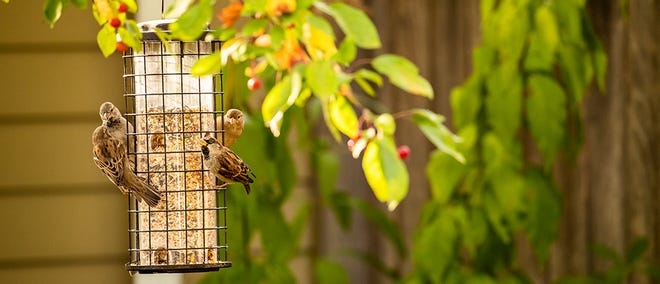Soaring bird food sales fuel sunflower production

Backyard bird-feeding sales have been booming during the COVID-19 pandemic, giving an unexpected boost to sunflower growers and processors.
“Suddenly people of all ages have been drawn to bird-watching as they spend more time at home,” says Travis Schmidt, account manager, CHS Sunflower. “They’re looking for tranquility and a connection to nature that makes them feel good.
As one of the nation’s top six bird food processors, CHS has participated in the groundswell. CHS markets Feather Friend® and Chirp® wild bird food to cooperatives and farm-supply and garden-supply retailers, produces private-label bird food such as Royal Wing (a former CHS brand, now owned by Tractor Supply Co.) and sells bulk ingredients to other bird food manufacturers.
The CHS sunflower processing facility in Grandin, N.D., has handled near-record volumes and sales this year. One of the company’s largest retail customers reported its bird food sales are up 100 percent over last year, consistent with the national trend.
With downloads of bird identification apps and bird feeder sales soaring, bird food demand may remain elevated for the foreseeable future. “Birding has been a blessing for many people during quarantine. Once you hang a feeder, you tend to get hooked,” says Schmidt.

Growing opportunity
Ask Peter Ness why he grows sunflowers and the first thing he’ll tell you is it’s a bottom-line decision.
“Sunflowers are the only thing that pencils out to make money,” he says. “They fit my crop rotation, which includes wheat, barley and soybeans, and sometimes edible beans and corn.”
The Sharon, N.D., grower also admits raising the giant yellow flowers is fun. “I just enjoy them. I like watching them blooming in the summer,” he says. “You don’t see a lot of sunflowers in this area. Some farmers don’t realize the hybrids have gotten much more resistant to disease.”
Ness contracts with CHS to grow sunflowers for the confectionary market, which includes snacking and baking uses. He plants Royal Hybrid® seed from CHS and delivers his harvest to the processing plant 60 miles from his farm.
Despite major crop losses in 2019 due to an October blizzard and unusually wet, cloudy and humid weather, Ness added 150 more acres of sunflowers this year for a total of about 550 acres.
“My advice is to get sunflowers in the ground as early as you can. It’s tempting to put them in poor soil because they’ll produce on ground where other crops won’t, but my yield went from 1,500 pounds per acre to 2,000 pounds when I started planting them on better ground,” says Ness. “I also recommend using a good crop protection program, including a strong preemergence herbicide plan.”
Collaborating for Quality
“We normally visit sunflower contract farms two or three times a year to help produce a better crop,” says Devin Gaugler, agronomy and procurement specialist for CHS Sunflower. “We check for quality and yield and provide supplemental advice to local agronomists to help with planting and fertility decisions, as well as timely weed, insect and disease management.”
Ness says he appreciates the extra effort and expertise. “Devin travels throughout North Dakota, South Dakota and Minnesota checking sunflower fields. He’s seen what works and what doesn’t work for insecticides, herbicides, fungicides, seeding rates and everything else.”
Gaugler visits Logan Boeddeker’s farm in Hillsboro, N.D., during the season to check on his crop of extra-long sunflower seeds destined for the international in-shell market.

“Working closely with growers like Logan and Peter helps ensure consistent, damage-free seeds and kernels so growers earn a premium price for their specialty crops,” says Gaugler. “As a leading cooperative, we reach out to customers around the world to position our growers and build a loyal market for their high-quality sunflower seeds.”
More growers are adding sunflowers into their crop rotation for better soil health, weed management and return on investment, adds Gaugler, including growers in states like Montana, Colorado, Nebraska and Texas who have contracted with CHS, expanding the more traditional sunflower growing region of the upper Midwest. CHS also contracts sunflower acres in Manitoba, Canada.
To pave the way, the CHS Sunflower breeding program develops innovative hybrids with seed characteristics buyers want — including shell color and stripe, seed size and hull-to-nut ratio — and the production qualities growers need.
“New Royal Hybrid sunflower varieties, including shorter maturity varieties with tolerance to Express herbicide, are giving more growers the ability to add sunflowers to their crop rotation,” says Gaugler.
“As cooperative owners, farmers can earn patronage on the hybrids they purchase from CHS and the sunflower seed they sell to us,” he adds. “We’re adding value and building relationships to help farmers succeed.”
This article and images are reprinted with permission from the Fall 2020 issue of C magazine, a publication of CHS. Find more at chsinc.com/c.